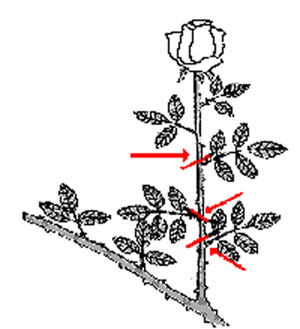Fertilizing and Watering
When spring clean-up has been completed, fertilize established roses with granular fertilizer according to the manufacturer’s directions on the package, work into the soil and water well. Alternatively, you can use water-soluble fertilizers, organic fertilizers or compost. DO NOT fertilize newly planted roses until after their first bloom.
The next application of fertilizer should be made just before the peak of bloom (June), and a third application may be made in mid-July. Later applications are not recommended as plants must ripen wood before winter sets in.
Suitable fertilizers include special rose food, those of 1-2-1 ratio, e.g.: 10-29-10, 5-10-8 or 6-12-8 analysis. In Quebec some spray with alfalfa tea (made by adding water to alfalfa, covering it and letting it stand for at least 24 hours.) Or the alfalfa can be spread around the rose bushes and worked into the soil.
Water at the rate of 8 litres (2 gals) per plant once a week (more in hot weather) unless it has rained, preferably applied at ground level. Do not water in the hot sun and make sure the foliage is dry by nightfall.
Deadheading
The removal of spent flowers ensures a continuous supply of blooms. Cut just above an outward facing 5-leaflet leaf on a cane strong enough to support a new bloom.
Disease Control
Roses have a reputation for being susceptible to disease and insect pests and spraying with chemicals is no longer permitted in Canada. Most of the newer Canadian bred roses are very disease resistant but insects can remain a problem in some areas.
The Jardin Botanique in Montreal has an excellent article on its website on how to deal with both rose diseases and insect pests in an environmentally friendly way. You can find the article at https://m.espacepourlavie.ca/en/roses-diseases-and-pests
